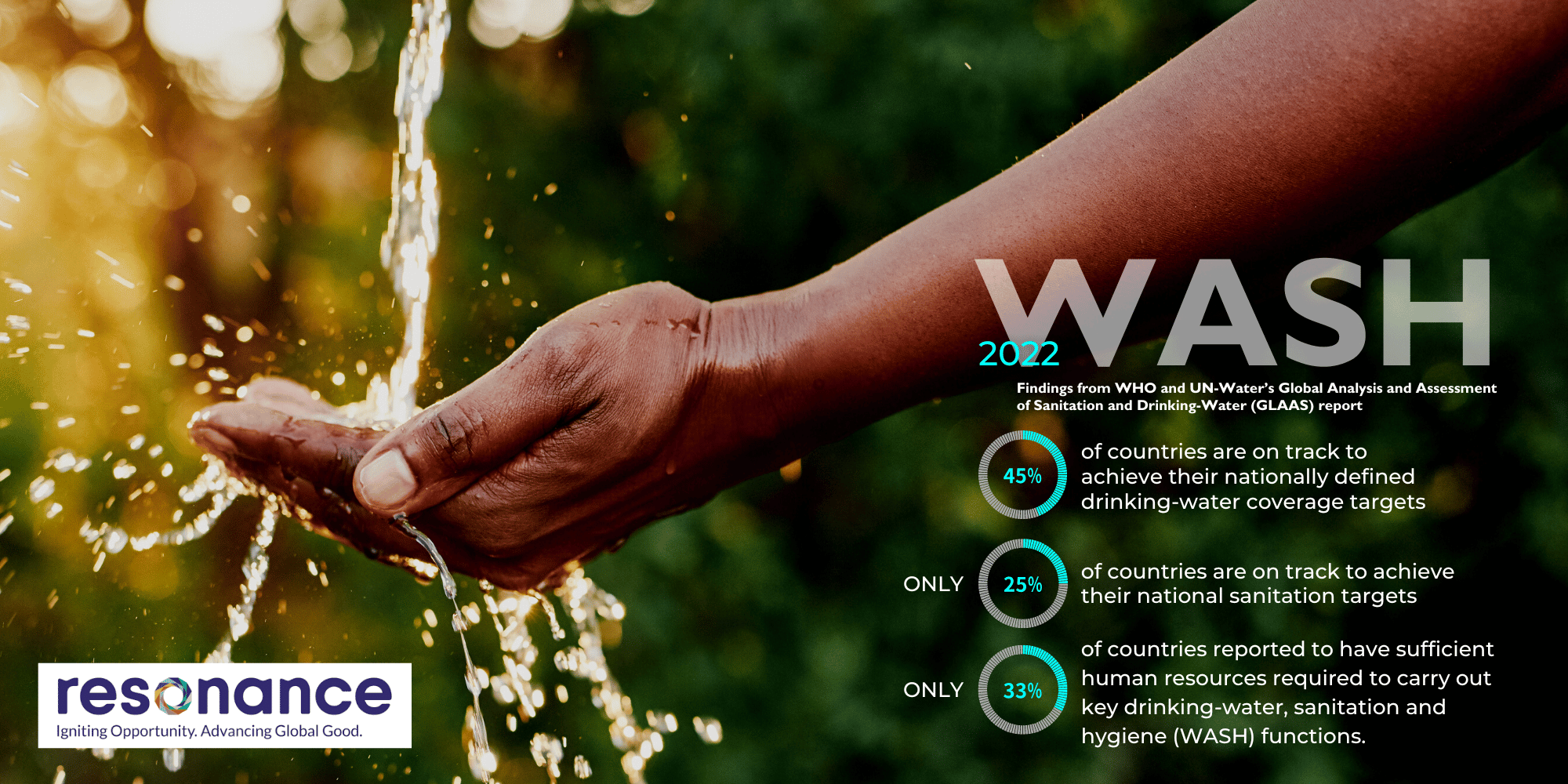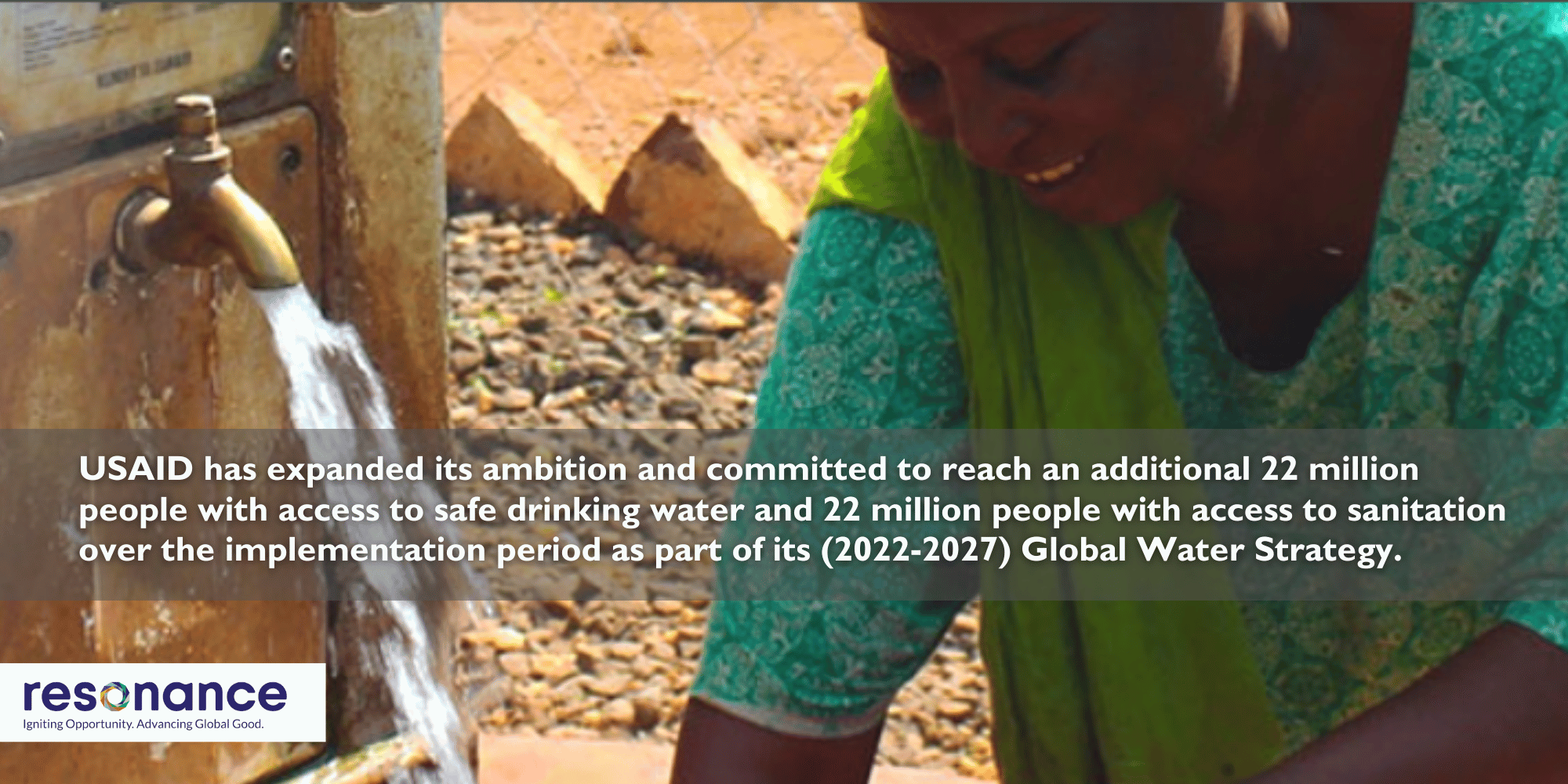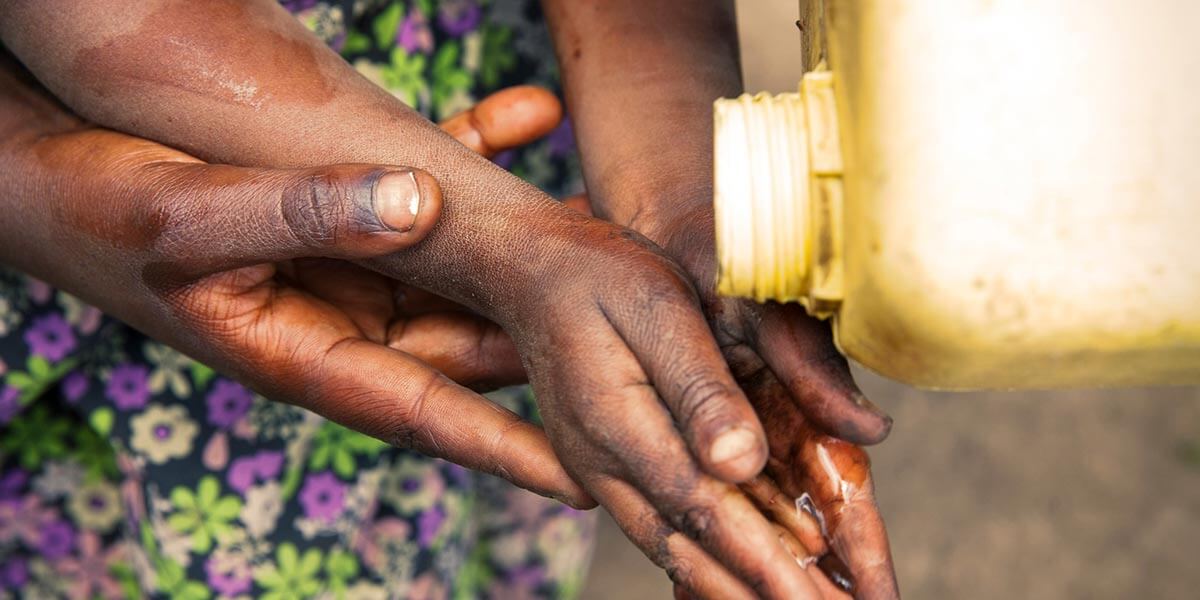Ensuring the global population has access to clean water, sanitation, and hygiene (WASH) is a pressing concern for the international development community. UNICEF and the World Health Organization estimate that 1 in 3 people lack access to safe drinking water, while over 2 billion people worldwide do not have access to basic sanitation.
The severe global gap in WASH access is a crisis. Findings from the World Health Organization (WHO) and the UN-Water’s Global Analysis and Assessment of Sanitation and Drinking-Water (GLAAS) 2022 report show that "acceleration is needed in many countries to achieve the UN Sustainable Development Goal (SDG) 6 – water and sanitation for all by 2030."
The statistics are alarming: According to the GLASS report, although 45% of countries are on track to achieve their nationally defined drinking-water coverage targets, only 25% of countries are on track to achieve their national sanitation targets. Only 32% of countries reported to have sufficient human resources required to carry out key drinking-water, sanitation and hygiene (WASH) functions. Although there has been an increase in WASH budgets in some countries, a significant number – over 75% – of countries reported insufficient funding to implement their WASH plans and strategies. Often the most vulnerable suffer from inadequate resources.
Annually, hundreds of thousands of young children die due to diarrheal diseases linked to inadequate WASH services. Limited WASH access curbs school attendance rates and places undue burden and strain on women and children, who often must trek many miles from their homes to access clean water.
So what can the global development community do to make progress on WASH goals?
Like many sustainable development challenges, there are no easy or quick fixes. However, we’ve seen the potential of market-led solutions and private sector innovations for WASH—and we’d argue that the private sector must be part of the solution. 
5 Tips for Collaborating with the Private Sector on Water, Sanitation, and Hygiene (WASH)
Through our work partnering with the private sector on WASH in East Africa, we’ve extracted five key insights on how the international development community can better mobilize and partner with companies and private financial institutions to achieve WASH goals.
1. Engage the Private Sector as a Key Partner for Scalable, Sustainable WASH Solutions
In many countries, local governments lack the resources or capacity to build, operate, and maintain centralized water and sewer systems, especially in rural areas. It’s also usually cost-prohibitive for the private sector to go it alone. But when governments and the global development community co-invest in partnership with companies—local, regional, and international—we can unlock new opportunities to find effective solutions, injecting private sector innovation and market-driven pathways into WASH delivery systems.
The private sector can bring resources such as technology, expertise, funding, and market linkages that can deepen development impact.
In Tanzania, we worked on the USAID/Tanzania Water Resources Integration Development Initiative (WARIDI), led by Tetra Tech, to extend access to clean water and improved sanitation for hard-to-reach communities in rural and peri-urban areas. We designed, built, and implemented 15 private sector partnerships.
For example, take WARIDI’s partnership with eWATERservices: We worked together to pilot eWATERservices’ smart water meter technology in rural Tanzania. eWATERservices’ technology allows community members to pre-pay for water at village water points using mobile money. The technology also ensures water revenue is tracked, accountable, and transparently used by water authorities to pay for needed maintenance and improvements to the water system. Resonance, WARIDI, and eWATERservices piloted the system in four villages, serving about 23,000 people.
By investing in private-sector partnerships like the ones with eWATERservices, the development community can help test and refine promising solutions in new markets—working together to clear initial obstacles, so companies can scale faster.
2. Help Stimulate Local Markets and Homegrown Private Sector Solutions for WASH
Young and growing companies can face numerous obstacles as they work to design, launch, and scale new solutions, particularly in rapidly growing economies. As part of our work on WARIDI, we first sought to understand what the major barriers were that prevented promising WASH companies from getting their products or services to communities. In Tanzania, many WASH companies struggled to build their supply chains and rural/peri-urban distribution channels.
We selected and supported three WASH companies with promising products and interest in expanding their distribution channels to rural areas. One of those companies was Kasole Secrets, which manufactures menstrual hygiene products. Our team tailored business development services and training to help Kasole Secrets with business planning, organizational development, human resources, and marketing management capacity. We also coordinated a series of meetings between Kasole Secrets and WARIDI’s network of potential distributors and retail partners across 20 districts.
This support helped Kasole Secrets win major grants from Grand Challenges Canada and UNICEF to continue building out manufacturing and distribution channels in peri-urban and rural Tanzania.
The international development and donor community can play a pivotal role in eliminating or reducing obstacles that stand between promising WASH products and services and the communities that need them. Such support achieves multiple goals. It helps local economies and creates jobs; it also gets WASH solutions into difficult-to-reach communities—tapping market-led channels that can, ideally, continue to take off, evolve, and scale without continued donor support.
3. Encourage Partnerships Between Local Finance Institutions and WASH Companies
Around the world, many households do not have enough disposable income to fully pay for WASH solutions such as plumbing or latrines, especially in rural areas. However, the financial sector is often reluctant to finance these household purchases because they do not generate cash flows to repay the loan—as compared to other assets such as motorbikes or basic farming equipment. Further, the companies that sell and distribute WASH products often deprioritize rural households in favor of urban households due to the greater costs involved in rural customer acquisition and providing post-sales maintenance services.
We see two key mutually reinforcing ingredients to help close this rural financing gap: The first is crafting partnerships between socially-minded local finance institutions (such as microfinance institutions or banks with strong rural presence) and WASH companies. By sharing costs, such partnerships can reduce the burden on WASH companies and financiers as they work to identify and support customers in rural areas.
Second, we need simple loan products with comparatively longer tenures (12-24 months) than what is commonly provided to rural households. These loans may be supported with a combination of grants and de-risking mechanisms such as (a) grants to support the partners’ operating expenses until the loan portfolio reaches a minimal scale (ideally break-even); (b) partial guarantees on loan portfolios; and/or (c) partial principal repayments on individual loans tied to WASH impact.
The global development community can do much to advance such partnerships and crowd-in financiers to provide WASH loans to rural households. It is as much about crafting the right partnerships as it is about designing the right financial products or de-risking mechanisms.
4. Host Open Innovation Competitions to Find Market-Led WASH Solutions
For decades, the private sector has used innovation hubs and open innovation challenges and prizes to source new and more sustainable technologies, inputs, products, and packaging. Forward-thinking multinational companies such as Unilever, PepsiCo, and Ingredion understand the value that can come from crowdsourcing and combining the ideas, knowledge, and expertise of people inside and outside their companies.
The global development community is also increasingly tapping open innovation to solve intractable or fast-emerging development challenges—as we’ve seen with USAID’s flagship Development Innovation Ventures (DIV) program and the Bill & Melinda Gates Foundation’s Global Grand Challenges—both of which have invested in WASH innovators. And we’ve witnessed first-hand the evolution of this approach to global development: We’re currently leading the USAID Catalyst project to support USAID in deploying open innovation across the Agency, spanning diverse development sectors and every geography.
Open innovation has been—and will continue to be—a powerful tool for WASH, allowing us to source, test, and scale promising new ideas and context-smart business models from local and global innovators.
5. Support Stronger Partnerships Between Local Governments and the Private Sector to Advance WASH Access
In many countries, local government agencies struggle to vet, contract, and partner with private enterprises. At the same time, the private sector may be reluctant to do business with government, as in some countries there can be a deep mistrust between the two sectors.
But to succeed in expanding access to WASH, we need the government and the private sector working together. One way that we’ve found to help bridge the divide is for the global development community to provide training, tailored support, and technical assistance to local governments to help them launch or deepen partnerships with the private sector on water management and sanitation solutions.
For example, on the USAID/East Africa Planning for Resilience in East Africa through the Policy, Adaptation, Research, and Economic Development (PREPARED) project, we worked with local government, regional bodies, and water management authorities in target countries to enhance private sector engagement (PSE) for water resources management.
In addition to PSE capacity building for target public sector partners, we also facilitated a partnership between the Ugandan National Water and Sewerage Corporation, a public utility, and an international technology company, Itron. Together, the partners piloted new technology to combat non-revenue water—or water lost due to leaking pipes, broken water meters, and illegal connections. The partnership reduced non-revenue water in the system from 45% to 20%, increasing the water utility’s revenues by hundreds of thousands of dollars and enabling new water connections for roughly 12,000 people.
Partnering with the Private Sector to Expand WASH Access
Access to clean water and sanitation for all people is part of the United Nation's 17 Sustainable Development Goals (SD-6). For the development community, including USAID, making progress on this goal is a key priority. During the implementation of its first five-year strategy, USAID reports the catalyst agency exceeded its targets to provide 15 million people with access to safe drinking water and eight million people with access to sanitation services.
Under its 2022-2027 Strategy, announced in October, USAID is expanding its ambition and committed to reach an additional 22 million people with access to safe drinking water and 22 million people with access to sanitation over the five-year implementation period. Notably, for the first time, USAID’s sanitation target is equal to the water target to signal the Agency’s commitment to elevating an often-forgotten issue of critical importance to protecting public health, dignity, equity, and our environment.
Fittingly, the global community is preparing to assess how far we’ve come on global water security, and how far we have yet to go. In March 2023, the United Nations General Assembly (UNGA) will convene its first conference on water since 1977.
Dialogue will center around five themes, including in addition to water for sustainable development, climate, resiliency and environment, and water for cooperation, the first focus area listed is "Water for Health: Access to WASH, including the Human Rights to Safe Drinking Water and Sanitation." These themes converge around the “Water Action Agenda” – a platform for voluntary commitments and new and innovative approaches. It is anticipated that private sector engagement, in the form of not only cross-sector partnerships, but collaborations around innovation and innovative fiance mechanisms, will be central to these deliberations.
As our work in this area informs our Insights, we understand that by working with the private sector to find and deploy WASH solutions, we will have a better chance of reaching our WASH goals faster, more sustainably, and at scale.
Editor’s Note: This post has been updated for accuracy and current best practices.



